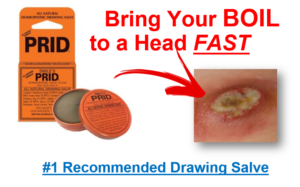How to Get a Boil to Pop
 Having a boil can be one of the most painful skin ailments. You may be wondering how to get your boil to pop so the pressure can be released and it can begin to heal.
Having a boil can be one of the most painful skin ailments. You may be wondering how to get your boil to pop so the pressure can be released and it can begin to heal.
Let me first start off by saying that squeezing a boil or taking a sharp instrument yourself and opening a boil is not recommended. Pretty much any doctor will advise against it since there’s a high risk of spreading infection to yourself and others.
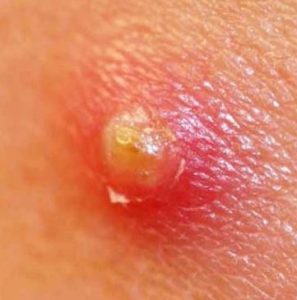 If you feel that your boil should have already popped and it’s getting to be too much, your doctor can lance it for you (scroll down to watch how it’s done).
If you feel that your boil should have already popped and it’s getting to be too much, your doctor can lance it for you (scroll down to watch how it’s done).
However, most boils are relatively common and can be treated without forcing it open.
How to Get a Boil to Pop On Its Own
 1.) Apply a warm, wet washcloth over the boil for 20 min, at least 3 times per day. The heat will cause the blood vessels under the skin to expand, increasing the blood and lymph flow, in turn causing the boil to come to a head and eventually naturally pop.
1.) Apply a warm, wet washcloth over the boil for 20 min, at least 3 times per day. The heat will cause the blood vessels under the skin to expand, increasing the blood and lymph flow, in turn causing the boil to come to a head and eventually naturally pop.
TIP: If you suspect the boil is close to popping, take some antibiotic wipes with you when you leave the house (or leave them in your car) just in case. You don’t want to be caught off guard, and it’s important that the pus doesn’t spread to anyone else or on anything. The bacteria from the puss can spread on you or to others.
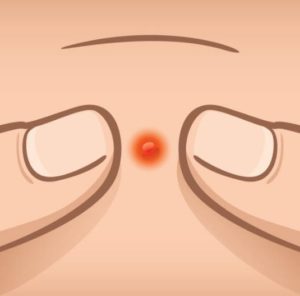 2.) Once it pops, promote drainage. You can help the boil to drain by lighting pressing around the edges of the boil. Expect quite a bit of blood and pus to come out of it, so be ready with clean gauze or tissue to soak up the drainage.
2.) Once it pops, promote drainage. You can help the boil to drain by lighting pressing around the edges of the boil. Expect quite a bit of blood and pus to come out of it, so be ready with clean gauze or tissue to soak up the drainage.
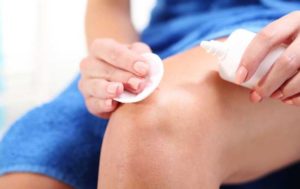 3.) Clean the area thoroughly with antibacterial soap. You can also use Hibiclens, which is a powerful skin cleanser and antiseptic many doctors recommend after surgery to keep the wound area clean. Bacteria from your boil can spread to other places on your body and cause an infection, as well as to another person.
3.) Clean the area thoroughly with antibacterial soap. You can also use Hibiclens, which is a powerful skin cleanser and antiseptic many doctors recommend after surgery to keep the wound area clean. Bacteria from your boil can spread to other places on your body and cause an infection, as well as to another person.
You will most likely need to clean it several times a day for the next couple of days after it opens. Be sure to use a clean bandage or gauze each time.
The Best Natural Remedies for Boils After it Pops
Once your boil is open, here are some natural remedies for boils you should apply each day to help speed up the recovery time.
 1.) Soak in Epsom Salt
1.) Soak in Epsom Salt
You can either soak the localized area, or fill up the tub and take a full Epsom Salt bath. Epsom salt not only contains healing properties, but it can help dry out the pus and assist the boil in draining more efficiently.
 2.) Apply Natural Oils
2.) Apply Natural Oils
Tea Tree Oil, Castor Oil, and Neem Oil are all very beneficial in helping a boil to heal. They contain antibacterial and antiseptic properties that will help keep the infected area clean from bacteria and help it heal.
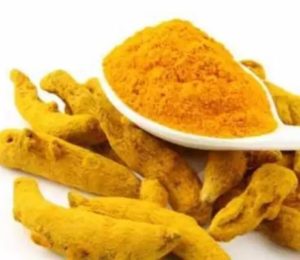 3.) Use Turmeric Powder
3.) Use Turmeric Powder
Turmeric has been used for many centuries in Eastern medicine, and can help soothe the boil with its anti-inflammatory properties. You can make a simple turmeric paste by mixing turmeric powder with water or ginger, and then spreading it over the boil a couple times a day.
When Should You See a Doctor About Your Boil?
 Although most boils heal just fine with home treatment, there are some cases when you need to see a doctor. Here is some good criteria to help you decide if you need professional care.
Although most boils heal just fine with home treatment, there are some cases when you need to see a doctor. Here is some good criteria to help you decide if you need professional care.
If…
- You are in severe pain
- You have a fever
- You have diabetes
- It’s near your eyes, spine, or anus
- You get a large number of boils over a period of several months
- The boil is abnormally large (golf ball size)
- There is no improvement after 7 days
Keep in mind these are general guidelines. If you have concerns, please don’t hesitate to make an appointment with your doctor.
Lancing a Boil
Your doctor may decide to lance your boil if it’s bad enough or it hasn’t come to a head after a week or so.
Here’s a video of a boil being lanced and the puss being squeezed out. (Remember, this procedure should ONLY be performed by a doctor.)
After your boil is lanced by your doctor, they will most likely prescribe you antibiotics so your body can fight any infection
(You can see a list of antibiotics for boils here that your doctor may prescribe you.)
How to Pop a Boil With No Head
If your boil doesn’t have a head, follow my recommendation above by using a wet and warm (or mildly hot) washcloth, and letting it sit on the boil multiple times a day to encourage blood flow and get the boil to come to a head.
Sometimes a boil will heal without coming to a head. But if it hasn’t come to a head and it’s still painful after 5 – 7 days, it’s time to make an appointment with your doctor.
It never hurts to try home treatments such as soaking it in Epsom salt and applying the natural oils each day first, but if it doesn’t heal on its own, then it’s time for professional treatment.
Risks of Popping a Boil On Your Own
If you’ve read this far, then you already know my take on popping your own boil with force (not a good idea).
So let me give you some of the drawbacks of popping a boil on your own.
- Spread Infection: You can spread staphylococcus or other bacteria that can spread to other parts of your body, or even someone else. This can cause a boil or infection to form where there’s skin contact.
- No antibiotics: You’ll technically have an open wound with no antibiotics, since antibiotics require a prescription from a doctor.
- Lack of sterile equipment: A doctor’s office is equipped with the proper surgical instruments and sanitization methods necessary to keep you from getting an infection. Doing it yourself increases the likelihood of an infection.
- Lack of sterile environment: This goes in hand with the previous point. Doing this at your kitchen table or bathroom is not exactly the most sanitary place to open up your skin.
Conclusion:
Most boils will pop on their own without any issues. Following these methods can help speed the process along and aid in the healing process. In some rare cases, you may need to see a doctor who can provide the care, procedure, and medication you need.
